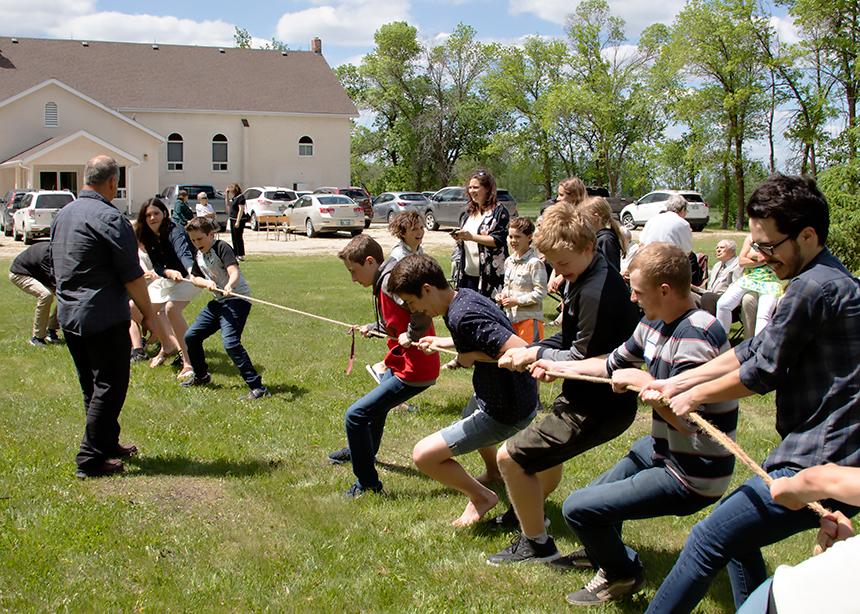“The congregation is the foundational unit and expression of God’s work in the world.” That was a key affirmation in the Future Directions process that led to the 2017 re-organization of Mennonite Church Canada. In this issue’s feature starting on page 4, MC Canada’s executive minister, Doug Klassen, calls for a strengthening of our denomination’s core: the congregations.
The churches in MC Canada number about 217, scattered from British Columbia to New Brunswick. Browsing through the regional church directories, one comes across some unusual church names: there’s Eyebrow Mennonite and Superb Mennonite, both in Saskatchewan. There’s a Sterling in Manitoba and a Stirling in Ontario.
The list includes nine churches with “First” in their name, located in five provinces! One of them is actually called “The First Mennonite Church,” which happens to be the oldest Mennonite church in Canada. It’s in Vineland, Ont.
Some churches include theological terms in their names: Community, Faith, Grace, Hope, and four with Peace in their name. There is a Covenant church, a Jubilee church and a Trinity church. Chosen church names include: New Life, Living Hope, Living Stones, Living Water, Living Word and Level Ground.
Almost every issue of Canadian Mennonite carries at least one story of an MC Canada congregation. It would be unwise to draw too many conclusions, but here are a few things their stories show:
- Church members like to have fun through picnics, plays, singing, movies and sports. One church unleashed creativity by hosting an art show and another made crokinole boards to raise money for the ministry of International Witness.
- Congregations help meet the needs of their neighbourhoods through community gardens and collaboration with food banks. Churches provide welcome to refugees, share space with community groups and sponsor a house for people in recovery.
- Facing new realities due to demographic and societal changes, congregations are exploring what their role is in their community. One church re-arranged its worship space to create more connections with worshippers. One church tries “away” activities in the place of every-Sunday traditional worship. Congregations are learning to cooperate with each other through joint education events and other joint projects.
- Churches depend on volunteers. One church celebrated the ministry of long-time deacons in its midst. Some churches with part-time staff call on all congregants to pitch in to help make church activities happen.
- Congregations gain in vision and vitality when they take active steps to become a place of welcome. An Alberta church prays about reaching out to more Oromo people in their city and beyond. Other churches are deliberate about living as a body comprising people from multiple cultures. Some churches are expanding their welcome to include members of the LGBTQ+ community.
As we hear all these stories, let’s celebrate the longevity of congregations that mark decades of existence. And let’s find ways to walk alongside the congregations facing the hard realization that they may no longer be sustainable.
Sometimes the stories remind us of unfinished business. In the past year, stories told of four churches that decided to end their official connections with their regional church. This news brings sadness but also a challenge. We have the ongoing opportunity to listen to those churches that feel uncomfortable within the MC Canada fold. How do we, as individuals and as congregations, truly hear each other’s concerns, working at a unity that will likely not mean total agreement? Can disparate congregations find ways to strengthen the bonds between them in spite of their differences?
We can pray for each other, taking inspiration from Nordheim (Man.) Mennonite Church, that, although geographically distant from its sister congregations, is taking time to learn about and pray for them on a regular basis. We can seize the opportunity to visit each other’s worship services and to take part in outreach projects together. Maybe our churches can even find ways to have fun together!
Read more editorials:
Limits and surprises
Cultivating hope
Reporting on #ChurchToo
#ICYMI: 2019 in review
Church publications: Which way to go?




Add new comment
Canadian Mennonite invites comments and encourages constructive discussion about our content. Actual full names (first and last) are required. Comments are moderated and may be edited. They will not appear online until approved and will be posted during business hours. Some comments may be reproduced in print.